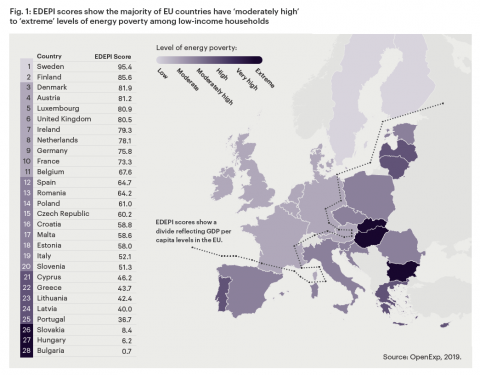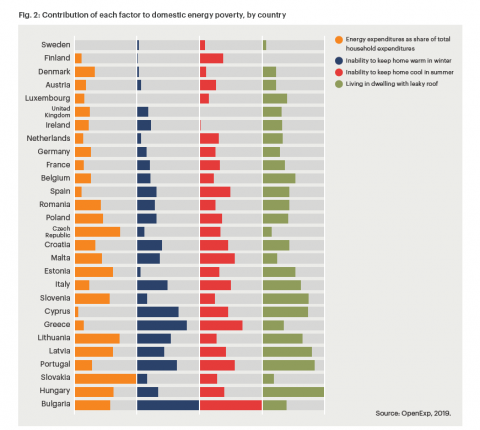First-of-its-kind EU-wide ranking reveals energy poverty especially prevalent in south and east of Europe, and worst in Bulgaria.
A majority of EU countries have significant levels of energy poverty and are unable to keep all their citizens warm this winter, groundbreaking new research by Open Exp released today by the European Right to Energy coalition reveals.
#EnergyPoverty harms all year round, and Southern Europe is on the frontlines, new research shows. Read more https://t.co/qgSrPGH0oF #EndEnergyPoverty #fuelpoverty @EnActNow @foeeurope @OpenExpEnergy @RightToEnergy @GreenpeaceEU @COFACE_EU pic.twitter.com/Wy87iWYDiB
— EU Energy News (@EUEnergyNews) February 20, 2019
The first-of-its-kind EU-wide ranking shows energy poverty is especially prevalent in southern and eastern EU Member States. Bulgaria far outstrips other countries for prevalence of four key indicators – damp and leaky homes, high energy costs for households, inability to keep homes warm against winter, and inability to keep homes cool in summer. Sweden and Finland rank as best performing countries.

Key findings:
- A majority of EU countries – 17 – have significant levels of energy poverty;
- The share of household expenditure spent on energy is rising in Europe, with increases more prominent in low-income families – whose expenditure increased 33% between 2000 and 2014;
- A clear divide exists between northern/western and southern/eastern European countries;
- Socio-economic factors play a bigger role in high energy poverty levels than weather;
- Countries with strong building regulations and higher GDP per capita show lower levels of energy poverty;
- Worst performing countries face both winter and summer energy poverty.
Analysis nevertheless reveals a lack of political action to address energy poverty: Greece was the only EU Member State to have included an energy poverty objective in draft National Energy and Climate Plans; whereas national energy efficiency targets, which contribute to alleviating energy poverty, also fail in total to reach the agreed EU target of 32.5% by 2030.
Yamina Saheb, senior policy analyst for Open Exp, who led the research, said:
“To avoid low-income households falling victim to the fluctuations of energy prices and stagnating wages, governments must ensure buildings occupied by low-income families are positive energy. In other words, buildings must produce more energy than they consume to reduce low-income families’ energy bills to zero euros.”
Clémence Hutin, climate justice campaigner for Friends of the Earth Europe, said:
“Millions of EU citizens are freezing in their homes this winter and need immediate relief, due to our deeply wasteful energy system. But Europe also needs a massive programme of home insulation – providing liveable energy-efficient homes for all, green local jobs, lower energy bills, and reduced carbon emissions.”
Sian Jones, Policy Coordinator for European Anti Poverty Network (EAPN), said:
“Urgent EU action must be taken to tackle increasing energy poverty and the growing divide across Europe. People are less likely to face energy poverty where household incomes are higher and regulations stronger. The EU must promote integrated approaches – ban disconnections and ensure investment in energy efficient housing that benefits people on lower incomes”.
Sian Jones, Policy Coordinator for European Anti Poverty Network (EAPN), said:
“Urgent EU action must be taken to tackle increasing energy poverty and the growing divide across Europe. People are less likely to face energy poverty where household incomes are higher and regulations stronger. The EU must promote integrated approaches – ban disconnections and ensure investment in energy efficient housing that benefits people on lower incomes”.
Hot off the press – majority of EU countries unable to keep citizens warm this winter – first-of-its-kind EU-wide ranking reveals energy poverty especially prevalent in south and east of Europe, and worst in Bulgaria.
https://t.co/yDFwFbEg6b pic.twitter.com/pJCn9h4aBk— Friends of the Earth (@foeeurope) February 20, 2019
The ranking uses a composite index of four indicators, based on Eurostat data, which allows for the first time a comprehensive comparison of energy poverty across different countries, taking into account its causes and symptoms. The unique approach could be used to measure EU-wide progress on energy poverty under new EU energy legislation.
Increased awareness on energy poverty prompted the inclusion last year of mandatory measurement and action on energy poverty in the EU’s 2030 Energy Package. However, the Right to Energy coalition calls for national action plans in all EU countries, and for a ban on disconnections to protect the most vulnerable households.







